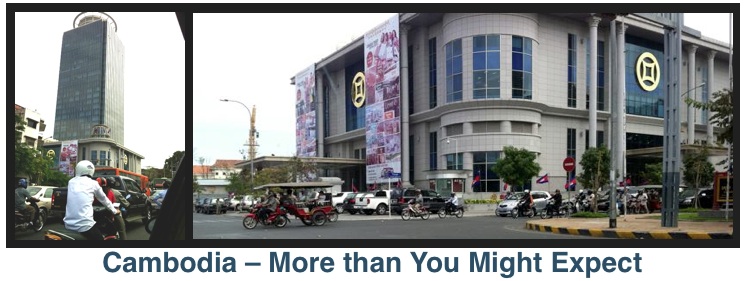Cambodia
– More than You Might Expect
In January 2011 I decided to visit Phnom Penh to see the change there
and to look at the potential for investment. I made this trip as
recently the requests for assistance by investors in looking at
Cambodia had increased as costs continued to rise for labor and other
inputs in China and elsewhere. I also made the trip because many
of my contacts urged me to visit and because I was getting to feel a
little out of date on developments there. One of the constants in
Asia is fast paced change and developing, young societies like Vietnam,
Cambodia and Laos are changing quickly as they open up to the world.
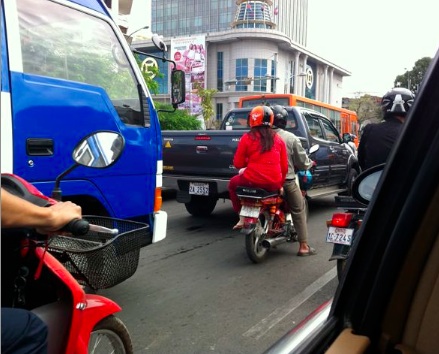
|
The
first thing that struck me in arriving in Phnom Penh was not the modern
airport which has existed for years or the visa on arrival program
where you get you visa at the airport for $20 for a tourist visa or $25
for an ordinary visa but all the growth that has taken place in the
areas around the airport. Streets are now paved, modern newly
constructed buildings are everywhere and there is a sense of business
hustle that never existed before.
According
to the CIA Fact book Cambodia has a population of 14.5 million, which
is quite a bit less than its neighbors Thailand at 67 million and
Vietnam at 89.5 million. Phnom Penh is now a city according to
the
local papers with a population of 2 million, which is much up from 5-10
years ago.
|
Although
this is a small city compared to Bangkok at 12
million or Ho Chi Minh City at approximately half that total, but Phnom
Penh is still far greater than Vientiane, Laos, which is estimated to
have a population of about 700,000 and most of the secondary cities in
Thailand or the region.

What
struck me about Phnom Penh as I made my way into the city center was
that it was no longer the sleepy village I once knew but now a vibrant
city with well paved roads, high rise buildings and much more
commercial activity than in years past. Billboards and signs
advertised many brands of cellular phone service and Richard Ellis and
other international groups advertise new building sites and rental
opportunities.
In meeting with various groups in the capital, I learned that among the
current opportunities in Cambodia are tourism, real estate – both
commercial and residential development, food processing, infrastructure
supporting plants like cement, electrical generation, agro businesses
of all kind, agriculture growth operations like cashew growing, rubber,
coffee, etc. Cambodia particularly excels as a location for agro
businesses and Chinese, Vietnamese and Thai companies as well as many
European firms are leasing major blocks of land for agriculture growing
operations.

|
Most of
the modern industrial estates in Phnom Penh are located out of the city
by the airport or even farther out. One of the best-run projects
is
the Phnom Penh Special Economic Zone (PPSEZ), which is run by the
Japanese. Prices here are higher but also the level of
infrastructure
and services vastly exceeds that of other industrial parks in Phnom
Penh. Garment and textile plants are generally located out by the
airport. Most of these are independently run and there is no
economic
zone per se where these ventures are sited. As such
infrastructure to
these factories tends to be weak and electrical blackouts and water
shortages are something that most of these plants deal with daily.
|
As
in other Asian countries, foreigners can’t own land in Cambodia but
they can lease up 10,000 acres by creating a Cambodian company.
Any project over US $1 million must have government approval and be
signed off by the government but these conditions are not onerous and
if you have a good guide to assist you to find properties and then are
assisted by competent legal counsel and a good accounting firm, both of
which are readily available in Phnom Penh. There are many
attractive opportunities to consider.
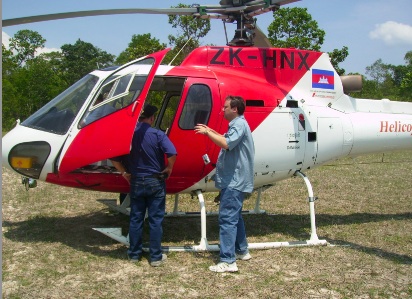 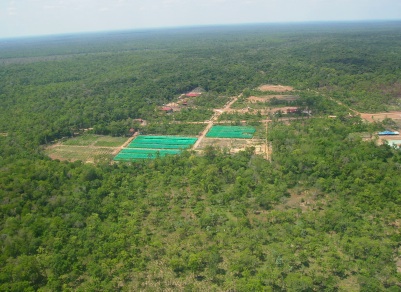
These opportunities are not only in Phnom Penh. Sihanoukville,
the major ocean port for Cambodia, also offers many
opportunities. The airport there has just finished and although
no major airline is yet serving this city – Air Asia is in talks on
possibly adding this to their extensive list of destinations.
Just offshore Chevron is going to start pumping crude oil and natural
gas from the undersea reservoirs that are shared with Thailand and
potentially with Vietnam. More professional beach resorts are
starting to pop-up and offshore islands offer lots of still unexploited
opportunities for further tourist sites. Tourism developers can
secure up to a 99-year lease concessions on the islands, which are
government owned. Only two islands have been developed as yet –
one is a timeshare project and there is a small Russian developed
island project, which is still in the early stages.
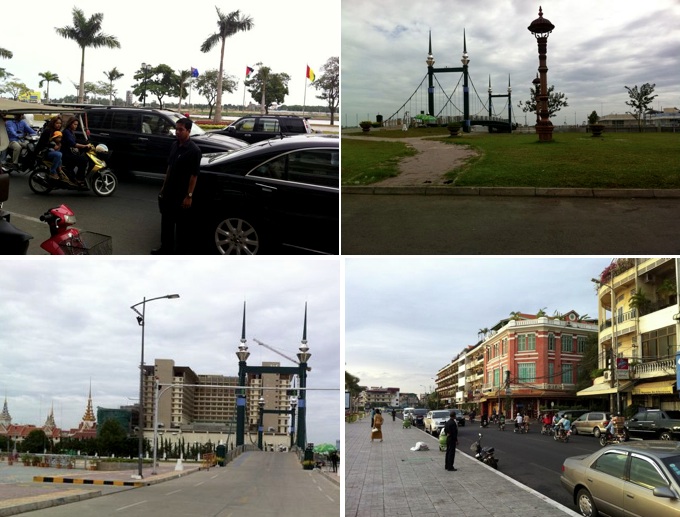
Another major change that struck me in Phnom Penh was that there now is
a wide range of commercial groups doing business in Phnom Penh.
Among some of the largest are:
- The
Royal Group – www.royalgroup.com.kh - Probably Cambodia’s largest and
most successful privately owned conglomerate owned by Neak Oknha Kith
Minh (please note that Oknha is a title given in Cambodia to a limited
number of highly successful or accomplished individuals).
- Lucky Market Group, Co. Ltd –
www.luckymarketgroup.com
- Locomo Co., Ltd. - www.locomo.com
- UNT Wholesale – www.untwholesale.com
- CBM Corporation – www.cbm.com.kh
- Mong Reththy Group – www.mongreththy.com
- LYP Group – www.lypgroup.com
- Paragon Corporation –
www.paragon-corp.com
- Overseas Cambodian Investment
Corporation – this is the parent company of Canadia Bank
- Sok Kong Import Export Co., Ltd.
www.sokimex.com.kh
- OMC Co., Ltd – www.omc.com.kh
- Cambodia Brewery Limited –
www.heinekeninternational.com/CambodiaBrewery-Cambodia.aspx
- Cambrew limited – www.angkorgroup.com.kh
- Attwood Group – www.attwoodgroup.com
- AZ Group
- Worldbridge Group
As
can be seen above and by visiting the websites noted, Cambodia now has
an active business community as can be seen in the companies
above. That night I met much of the expatriate business
community, which is mainly British, Australian, French, U.S. and many
other nationalities. Most of the many interesting and very
engaging people I met first came out to Cambodia looking to a short
stay and now many are married and all seem deeply entwined in Phnom
Penh and its growing businesses community. Many have tens and
more of years in Cambodia and even longer in the region. Other
Asian communities like the Japanese, Korean and more recently the
Chinese are now a common sight as well which gives Phnom Penh a very
international feel.
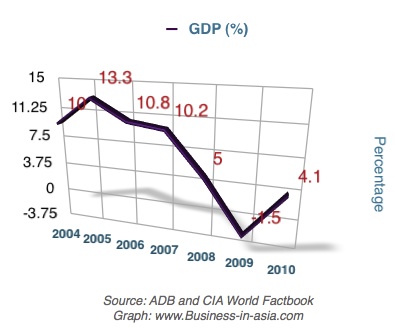
|
2010
had been a slower year for Cambodia just like it was for other nations
because of the world financial crisis. Despite this, economic
growth
grew at just over 4 % in 2010 and should be even higher in 2011.
I had to say that I was impressed by Phnom Penh and the change I saw
there. I also enjoyed the good food, relatively cheap prices, the
peoples’ warmth, the culture and the sense of possibilities that I
noted there. I recommend the city for a visit, as there are still
many
as yet untapped opportunities for the right investors.
>> For more data on Cambodia,
click
here.
|
About
the Author:
Christopher
W. Runckel, a former senior US diplomat who served in many
counties in Asia, is a graduate of the University of Oregon and Lewis
and Clark Law School. He served as Deputy General Counsel of President
Gerald Ford’s Presidential Clemency Board. Mr. Runckel is the principal
and founder of Runckel & Associates, a Portland, Oregon based
consulting company that assists businesses expand business
opportunities in Asia. (www.business-in-asia.com)
Until
April of 1999, Mr. Runckel was Minister-Counselor of the US
Embassy in Beijing, China. Mr. Runckel lived and worked in Thailand for
over six years. He was the first permanently assigned U.S. diplomat to
return to Vietnam after the Vietnam War. In 1997, he was awarded the
U.S. Department of States highest award for service, the Distinguished
Honor Award, for his contribution to improving U.S.-Vietnam relations.
|

